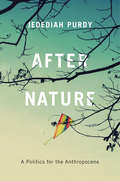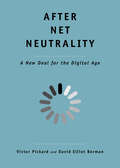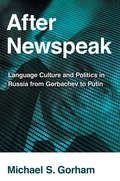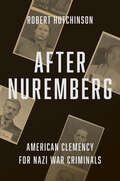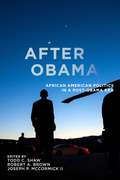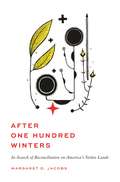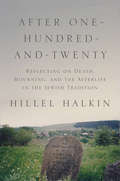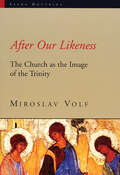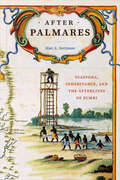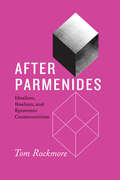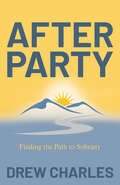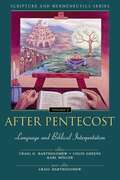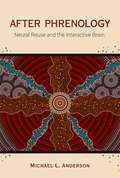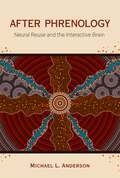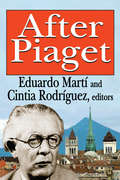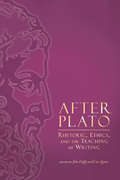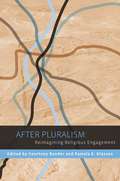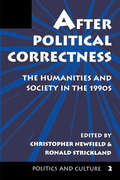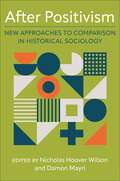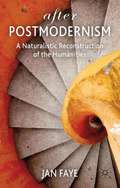- Table View
- List View
After Nature: A Politics for the Anthropocene
by Jedediah PurdyNature no longer exists apart from humanity. The world we will inhabit is the one we have made. Geologists call this epoch the Anthropocene, Age of Humans. The facts of the Anthropocene are scientific--emissions, pollens, extinctions--but its shape and meaning are questions for politics. Jedediah Purdy develops a politics for this post-natural world.
After Nature: A Politics for the Anthropocene
by Jedediah PurdyNature no longer exists apart from humanity. Henceforth, the world we will inhabit is the one we have made. Geologists have called this new planetary epoch the Anthropocene, the Age of Humans. The geological strata we are now creating record industrial emissions, industrial-scale crop pollens, and the disappearance of species driven to extinction. Climate change is planetary engineering without design. These facts of the Anthropocene are scientific, but its shape and meaning are questions for politics - a politics that does not yet exist. After Nature develops a politics for this post-natural world.
After Net Neutrality: A New Deal for the Digital Age (The Future Series)
by Victor Pickard David Elliot BermanA provocative analysis of net neutrality and a call to democratize online communication This short book is both a primer that explains the history and politics of net neutrality and an argument for a more equitable framework for regulating access to the internet. Pickard and Berman argue that we should not see internet service as a commodity but as a public good necessary for sustaining democratic society in the twenty-first century. They aim to reframe the threat to net neutrality as more than a conflict between digital leviathans like Google and internet service providers like Comcast but as part of a much wider project to commercialize the public sphere and undermine the free speech essential for democracy. Readers will come away with a better understanding of the key concepts underpinning the net neutrality battle and rallying points for future action to democratize online communication.
After Newspeak: Language Culture and Politics in Russia from Gorbachev to Putin
by Michael S. GorhamIn After Newspeak, Michael S. Gorham presents a cultural history of the politics of Russian language from Gorbachev and glasnost to Putin and the emergence of new generations of Web technologies. Gorham begins from the premise that periods of rapid and radical change both shape and are shaped by language. He documents the role and fate of the Russian language in the collapse of the USSR and the decades of reform and national reconstruction that have followed. Gorham demonstrates the inextricable linkage of language and politics in everything from dictionaries of profanity to the flood of publications on linguistic self-help, the speech patterns of the country's leaders, the blogs of its bureaucrats, and the official programs promoting the use of Russian in the so-called "near abroad."Gorham explains why glasnost figured as such a critical rhetorical battleground in the political strife that led to the Soviet Union's collapse and shows why Russians came to deride the newfound freedom of speech of the 1990s as little more than the right to swear in public. He assesses the impact of Medvedev's role as Blogger-in-Chief and the role Putin's vulgar speech practices played in the restoration of national pride. And he investigates whether Internet communication and new media technologies have helped to consolidate a more vibrant democracy and civil society or if they serve as an additional resource for the political technologies manipulated by the Kremlin.
After Nuremberg: American Clemency for Nazi War Criminals
by Robert HutchinsonHow the American High Commissioner for Germany set in motion a process that resulted in every non-death-row-inmate walking free after the Nuremberg trialsAfter Nuremberg is about the fleeting nature of American punishment for German war criminals convicted at the twelve Nuremberg trials of 1946–1949. Because of repeated American grants of clemency and parole, ninety-seven of the 142 Germans convicted at the Nuremberg trials, many of them major offenders, regained their freedom years, sometimes decades, ahead of schedule. High-ranking Nazi plunderers, kidnappers, slave laborers, and mass murderers all walked free by 1958. High Commissioner for Occupied Germany John J. McCloy and his successors articulated a vision of impartial American justice as inspiring and legitimizing their actions, as they concluded that German war criminals were entitled to all the remedies American laws offered to better their conditions and reduce their sentences. Based on extensive archival research (including newly declassified material), this book explains how American policy makers&’ best intentions resulted in a series of decisions from 1949–1958 that produced a self-perpetuating bureaucracy of clemency and parole that &“rehabilitated&” unrepentant German abettors and perpetrators of theft, slavery, and murder while lending salience to the most reactionary elements in West German political discourse.
After Obama
by Singh Robert S.Barack Obama's foreign policy has failed but the American strategic mind has not yet closed. In After Obama, Robert Singh examines how and why US influence has weakened and contributed to the erosion of the world America made, endangering international order and liberal values. A well-intentioned but naive strategy of engagement has encouraged US adversaries such as Russia, China and Iran to assert themselves while allowing Western alliances to fray. But, challenging claims of an inevitable American decline, Singh argues that US leadership is a matter of will as much as wallet. Despite partisan polarization at home and the rise of the rest abroad, Washington can renew American leadership and, through a New American Internationalism, pave a path to the restoration of global order. Timely and provocative, the book offers a powerful critique of the Obama Doctrine and a call for strategic resolution in place of 'leading from behind'.
After Obama: African American Politics in a Post-Obama Era
by Todd Shaw Robert A Brown Joseph P McCormick IIExamines the complicated political legacy of our first black presidentWritten during the presidency of Donald Trump, After Obama examines the impact President Barack Obama and his administration have continued to have upon African American politics. In this comprehensive volume, Todd C. Shaw, Robert A. Brown, and Joseph P. McCormick II bring together more than a dozen scholars to explore his complex legacy, including his successes, failures, and contradictions.Contributors focus on a wide range of topics, including how President Obama affected aspects of African American politics, how his public policies influenced the quality of Black citizenship and life, and what future administrations can learn from his experiences. They also examine the present-day significance of Donald Trump in relation to African American politics.A timely and thorough work, After Obama provides the first examination of the Obama administration in its entirety, and the lasting impact it has had on African American politics.
After One Hundred Winters: In Search of Reconciliation on America's Stolen Lands
by Professor Margaret D. JacobsA necessary reckoning with America’s troubled history of injustice to Indigenous peopleAfter One Hundred Winters confronts the harsh truth that the United States was founded on the violent dispossession of Indigenous people and asks what reconciliation might mean in light of this haunted history. In this timely and urgent book, settler historian Margaret Jacobs tells the stories of the individuals and communities who are working together to heal historical wounds—and reveals how much we have to gain by learning from our history instead of denying it.Jacobs traces the brutal legacy of systemic racial injustice to Indigenous people that has endured since the nation’s founding. Explaining how early attempts at reconciliation succeeded only in robbing tribal nations of their land and forcing their children into abusive boarding schools, she shows that true reconciliation must emerge through Indigenous leadership and sustained relationships between Indigenous and non-Indigenous people that are rooted in specific places and histories. In the absence of an official apology and a federal Truth and Reconciliation Commission, ordinary people are creating a movement for transformative reconciliation that puts Indigenous land rights, sovereignty, and values at the forefront. With historical sensitivity and an eye to the future, Jacobs urges us to face our past and learn from it, and once we have done so, to redress past abuses.Drawing on dozens of interviews, After One Hundred Winters reveals how Indigenous people and settlers in America today, despite their troubled history, are finding unexpected gifts in reconciliation.
After One-Hundred-and-Twenty: Reflecting on Death, Mourning, and the Afterlife in the Jewish Tradition
by Hillel HalkinAfter One-Hundred-and-Twenty provides a richly nuanced and deeply personal look at Jewish attitudes and practices regarding death, mourning, and the afterlife as they have existed and evolved from biblical times to today. Taking its title from the Hebrew and Yiddish blessing to live to a ripe old age--Moses is said to have been 120 years old when he died--the book explores how the Bible's original reticence about an afterlife gave way to views about personal judgment and reward after death, the resurrection of the body, and even reincarnation. It examines Talmudic perspectives on grief, burial, and the afterlife, shows how Jewish approaches to death changed in the Middle Ages with thinkers like Maimonides and in the mystical writings of the Zohar, and delves into such things as the origins of the custom of reciting Kaddish for the deceased and beliefs about encountering the dead in visions and dreams.After One-Hundred-and-Twenty is also Hillel Halkin's eloquent and disarmingly candid reflection on his own mortality, the deaths of those he has known and loved, and the comfort he has and has not derived from Jewish tradition.
After Our Likeness: The Church as the Image of the Trinity (Sacra Doctrina: Christian Theology for a Postmodern Age)
by Miroslav VolfIn After Our Likeness, the inaugural volume in the Sacra Doctrina series, Miroslav Volf explores the relationship between persons and community in Christian theology. The focus is the community of grace, the Christian church. The point of departure is the thought of the first Baptist, John Smyth, and the notion of church as "gathered community" that he shared with Radical Reformers.Volf seeks to counter the tendencies toward individualism in Protestant ecclesiology and to suggest a viable understanding of the church in which both person and community are given their proper due. In the process he engages in a sustained and critical ecumenical dialogue with the Catholic and Orthodox ecclesiologies of Joseph Cardinal Ratzinger and the metropolitan John Zizioulas. The result is a brilliant ecumenical study that spells out a vision of the church as an image of the triune God.
After Palmares: Diaspora, Inheritance, and the Afterlives of Zumbi (Radical Perspectives)
by Marc A HertzmanIn After Palmares, Marc A. Hertzman tells the rise, fall, and afterlives of Palmares, one of history’s largest and longest-lasting maroon societies. Forged during the seventeenth century by formerly enslaved Africans in what would become northeast Brazil, Palmares stood for a century, withstanding sustained attacks from two European powers. In 1695, colonial forces assassinated its most famous leader, Zumbi. Hertzman examines the remarkable ways that Palmares and its inhabitants lived on after Zumbi’s death, creating vivid portraits of those whose lives and voices scholars have often assumed are inaccessible. With an innovative approach to African languages, and paying close attention to place as well as African and diasporic spiritual beliefs, Hertzman reshapes our understanding of Palmares and Zumbi and advances a new framework for studying fugitive slave communities and marronage in the African diaspora.
After Parmenides: Idealism, Realism, and Epistemic Constructivism
by Tom RockmoreEngages with one of the oldest philosophical problems—the relationship between thought and being—and offers a fresh perspective with which to approach the long history of this puzzle. In After Parmenides, Tom Rockmore takes us all the way back to the beginning of Western philosophy, when Parmenides asserted that thought and being are the same. This idea created a division between what the mind constructs as knowable entities and the idea that there is also a mind-independent real, which we can know or fail to know. Rockmore argues that we need to give up on the idea of knowing the real as it is, and instead focus on the objects of cognition that our mind constructs. Though we cannot know mind-independent objects as they “really” are, we can and do know objects as they appear to us.After Parmenides charts the continual engagement with these ideas of the real and the knowable throughout philosophical history from Plato and Aristotle to Descartes, Kant, Fichte, Hegel, Schopenhauer, Marx, and others. This ambitious book shows how new connections can be made in the history of philosophy when it is reread through a new lens.
After Party: Finding the Path to Sobriety
by Drew CharlesA memoir of a husband and father&’s recovery from alcohol and drugs reveals how being alcohol-free has made his life richer. Many people struggle with substance abuse in the shadows feeling ashamed, alone, and inadequate. You are not alone. Many of us keep up appearances while at the same time kicking ourselves every time we stumble into bed drunk out of our minds. Many of us say, &“never again,&” only to drink again at 5:00pm. You are not alone. There is a way out of this. After Party is the story of how one person, Drew Charles, dug his way out of the spiral of drug and alcohol excess. While doing so, he discovered that sobriety is not the impossibly boring state of living so many of us fear but is filled with joy and excitement in ways we can&’t predict when we are stuck in the loop of drinking and drug taking. After Party is the honest account of Drew&’s first year of sobriety, how he did it, and more importantly, why he did it. Drew&’s hope is that anyone who battles with alcohol and drugs, or just feels curious about sobriety, can take solace in knowing that life not only exists beyond alcohol, but that it sings with a clarity and depth of emotion many of us would never have thought possible.
After Pentecost: Language and Biblical Interpretation (Scripture and Hermeneutics Series)
by Zondervan"There is always some view of language built into biblical interpretation. If we are to read Scripture to hear God&’s address it is vital that we attend to current debates about language and become critically conscious in this respect." Craig Bartholomew After Pentecost is the second volume from the Scripture and Hermeneutics Seminar. This annual gathering of Christian scholars from various disciplines was established in 1998 and aims to reassess the discipline of biblical studies from the foundations up and forge creative new ways for reopening the Bible in our cultures. The Seminar was aware from the outset that any renewal of biblical interpretation would have to attend to the issue of language. In this rich and creative volume the importance of linguistic issues for biblical interpretation is analyzed, the challenge of postmodernism is explored, and some of the most creative recent developments in philosophy and theology of language are assessed and updated for biblical interpretation. CONTRIBULTORS INCLUDE: Mary Hesse Ray Van Leeuwen Anthony Thiselton Kevin Vanhoozer Nicholas Wolterstorff
After Perfect: A Daughter's Memoir
by Christina McDowellA &“searing memoir of loss and redemption&” (People) that &“exposes the side of The Wolf of Wall Street we didn&’t get to see&” (Metro), After Perfect is a cautionary tale about one family&’s destruction in the wake of the Wall Street implosion.Selected as one of the year’s “Fifteen Books You Need to Read” by the Village Voice, Christina McDowell’s unflinching memoir is “a tale of the American Dream upended.” Growing up in an affluent Washington, DC, suburb, Christina and her sisters were surrounded by the elite: summering on Nantucket Island, speeding down Capitol Hill’s rich back roads, flying in their father’s private plane. Their life of luxury was brutally stripped away after the FBI arrested Tom Prousalis on fraud charges. When he took a plea deal as he faced the notorious Wolf of Wall Street Jordan Belfort’s testifying against him, the cars, homes, jewelry, clothes, and friends that defined the family disappeared before their eyes, including the one thing they could never get back: each other. Christina writes with candid clarity about the dark years that followed and the devastation her father’s crimes wrought upon her family: the debt accumulated under her identity; her mother’s breakdown; her own spiral into addiction and promiscuity; and the delusion that enveloped them all. She shines a remarkable, uncomfortable light on a family’s disintegration and takes a searing look at a controversial financial time and also at herself, a child whose “normal” belonged only to the one percent. A rare, insider’s perspective on the collateral damage of a fall from grace, After Perfect is a poignant reflection on the astounding pace at which a life can change and how blind we can be to the ugly truth.
After Phrenology
by Michael L. AndersonThe computer analogy of the mind has been as widely adopted in contemporary cognitive neuroscience as was the analogy of the brain as a collection of organs in phrenology. Just as the phrenologist would insist that each organ must have its particular function, so contemporary cognitive neuroscience is committed to the notion that each brain region must have its fundamental computation. In After Phrenology, Michael Anderson argues that to achieve a fully post-phrenological science of the brain, we need to reassess this commitment and devise an alternate, neuroscientifically grounded taxonomy of mental function. Anderson contends that the cognitive roles played by each region of the brain are highly various, reflecting different neural partnerships established under different circumstances. He proposes quantifying the functional properties of neural assemblies in terms of their dispositional tendencies rather than their computational or information-processing operations. Exploring larger-scale issues, and drawing on evidence from embodied cognition, Anderson develops a picture of thinking rooted in the exploitation and extension of our early-evolving capacity for iterated interaction with the world. He argues that the multidimensional approach to the brain he describes offers a much better fit for these findings, and a more promising road toward a unified science of minded organisms.
After Phrenology: Neural Reuse and the Interactive Brain
by Michael L. AndersonA proposal for a fully post-phrenological neuroscience that details the evolutionary roots of functional diversity in brain regions and networks.The computer analogy of the mind has been as widely adopted in contemporary cognitive neuroscience as was the analogy of the brain as a collection of organs in phrenology. Just as the phrenologist would insist that each organ must have its particular function, so contemporary cognitive neuroscience is committed to the notion that each brain region must have its fundamental computation. In After Phrenology, Michael Anderson argues that to achieve a fully post-phrenological science of the brain, we need to reassess this commitment and devise an alternate, neuroscientifically grounded taxonomy of mental function. Anderson contends that the cognitive roles played by each region of the brain are highly various, reflecting different neural partnerships established under different circumstances. He proposes quantifying the functional properties of neural assemblies in terms of their dispositional tendencies rather than their computational or information-processing operations. Exploring larger-scale issues, and drawing on evidence from embodied cognition, Anderson develops a picture of thinking rooted in the exploitation and extension of our early-evolving capacity for iterated interaction with the world. He argues that the multidimensional approach to the brain he describes offers a much better fit for these findings, and a more promising road toward a unified science of minded organisms.
After Physics
by David Z. AlbertHere the philosopher and physicist David Z Albert argues, among other things, that the difference between past and future can be understood as a mechanical phenomenon of nature and that quantum mechanics makes it impossible to present the entirety of what can be said about the world as a narrative of "befores" and "afters."
After Piaget
by Eduardo MartiAfter Piaget proves that Jean Piaget's work is critical for understanding some of the most current proposals in the study of psychological development. It analyzes Piaget's legacy, moving beyond the harsh critiques that have circulated since he lost prominence. It also brings together new developments and research practices that have grown out of Jean Piaget's tradition, while providing a retrospective glance into the intellectual atmospheres of different periods at which the contributors encountered Piaget.This book reveals the richness and coherence of the School of Geneva's research during the last decades before Piaget's death. Contributions from scholars who formed part of the School of Geneva during the 1970s and '80s demonstrate Piaget's influence on such diverse fields as infant development, ethnology, neuropsychology, semiotic development, and epistemology. After Piaget is part of Transaction's History and Theory of Psychology series.
After Piketty: The Agenda for Economics and Inequality
by Heather Boushey J. Bradford Delong Marshall SteinbaumAre Thomas Piketty’s analyses of inequality on target? Where should researchers go from here in exploring the ideas he pushed to the forefront of global conversation? In After Piketty, a cast of economists and other social scientists tackle these questions in dialogue with Piketty, in what is sure to be a much-debated book in its own right.
After Plato: Rhetoric, Ethics, and the Teaching of Writing
by John Duffy Lois AgnewAfter Plato redefines the relationships of rhetoric for scholars, teachers, and students of rhetoric and writing in the twenty-first century. Featuring essays by some of the most accomplished scholars in the field, the book explores the diversity of ethical perspectives animating contemporary writing studies—including feminist, postmodern, transnational, non-Western, and virtue ethics—and examines the place of ethics in writing classrooms, writing centers, writing across the curriculum programs, prison education classes, and other settings. When truth is subverted, reason is mocked, racism is promoted, and nationalism takes center stage, teachers and scholars of writing are challenged to articulate the place of rhetorical ethics in the writing classroom and throughout the field more broadly. After Plato demonstrates the integral place of ethics in writing studies and provides a roadmap for future conversations about ethical rhetoric that will play an essential role in the vitality of the field. Contributors: Fred Antczak, Patrick W. Berry, Vicki Tolar Burton, Rasha Diab, William Duffy, Norbert Elliot, Gesa E. Kirsch, Don J. Kraemer, Paula Mathieu, Robert J. Mislevy, Michael A. Pemberton, James E. Porter, Jacqueline Jones Royster, Xiaoye You, Bo Wang
After Pluralism: Reimagining Religious Engagement (Religion, Culture, and Public Life)
by Pamela E. Klassen Eds. Bender CourtneyThe contributors to this volume treat pluralism as a concept that is historically and ideologically produced or, put another way, as a doctrine that is embedded within a range of political, civic, and cultural institutions. Their critique considers how religious difference is framed as a problem that only pluralism can solve. Working comparatively across nations and disciplines, the essays in After Pluralism explore pluralism as a "term of art" that sets the norms of identity and the parameters of exchange, encounter, and conflict. <P><P>Contributors locate pluralism's ideals in diverse sites-Broadway plays, Polish Holocaust memorials, Egyptian dream interpretations, German jails, and legal theories-and demonstrate its shaping of political and social interaction in surprising and powerful ways. Throughout, they question assumptions underlying pluralism's discourse and its influence on the legal decisions that shape modern religious practice. Contributors do more than deconstruct this theory; they tackle what comes next. Having established the genealogy and effects of pluralism, they generate new questions for engaging the collective worlds and multiple registers in which religion operates.
After Political Correctness: The Humanities and Society in the 1990s
by Christopher NewfieldThis book resituates the political correctness debates in the humanities branch of the academy. Contending that conservatives have tainted entire academic disciplines, causing university humanists to go from irrelevant to dangerous overnight, the contributors see the PC debates as a struggle over the very purposes of higher education in the United States. Ronald Strickland and Christopher Newfield have assembled the best and the brightest from across the academic disciplines for disclosure on the future of higher education in light of PC.
After Positivism: New Approaches to Comparison in Historical Sociology
by Wilson, Nicholas Hoover; Mayrl, DamonWhat is the value of comparison for research in historical sociology? Today, social scientists regularly express doubt about the positivist premises that have long justified comparison’s use: that cases can be unproblematically compared as though they are independent of one another, that comparison can reliably yield valid causal inference, and that comparative methods can grapple with questions of meaning, sequence, and process that are central to historical explanation. Yet they remain reluctant to abandon comparison altogether, not least because comparisons are still manifestly useful in the research process.After Positivism presents a bold new set of warrants and methodologies for comparison that takes these criticisms fully into account. The contributors to this book marshal a wide array of postpositivist approaches to knowledge to reconstruct the analytic potential of comparison for a new generation of social scientists. In addition to providing fresh answers to classic questions about case selection and causal inference, authors ponder the role comparison plays in a world where social phenomena are demonstrably time-, space-, and concept-dependent; where causation is typically conjunctural; where social structures and groups emerge and die; and where important objects of inquiry can be understood only in terms of relationships, emergent properties, or contingent and irregular effects. Engaging and timely, this book will be of interest to all those who seek to improve our explanations of historical change in social-scientific research.
After Postmodernism
by Jan FayeThe philosophy of the humanistic sciences has been a blind-spot in analytic philosophy. This book argues that by adopting an appropriate pragmatic analysis of explanation and interpretation it is possible to show that scientific practice of humanistic sciences can be understood on similar lines to scientific practice of natural and social sciences.

